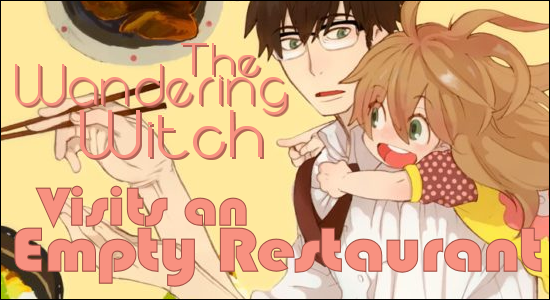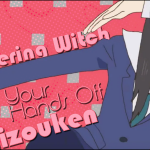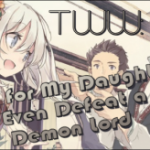The Wandering Witch – Visits an Empty Restaurant

Welcome, all, again. I am incredibly excited about this season’s offerings(!), a number of which seem to strongly emphasize artistry in both story-telling and visuals. But I am especially enjoying Sweetness and Lightning (sweetness & lightning on Crunchyroll.com), a show which explores the adaptive nature and strength of family. Now, it is true that this series is not one of the “artsy” ones alluded to above: Alderamin on the Sky, Orange, and 91 Days all boast strong plots and storylines, as well as artwork on a par with past favorite Aiura. 91 Days is especially gorgeous and well-told, a film noir homage to the very best cinematic portrayals of la cosa nostra. (Seriously, this show could become the anime equivalent of The Godfather–a recognized classic and standard of its genre.) But I’ll leave that discussion for another time, preferring to instead visit the homey charm and comfort of cooking together as a family. (As an unapologetic slice-of-lifer, what can I say? Other than: “Leave the gun. Take the cannoli.”)
![sweeteness+0101[1]](http://918thefan.com/wp-content/uploads/2016/07/sweeteness01011-300x168.png)
The Inuzuka family is undergoing dramatic change–it has been only months since Kohei’s wife died, leaving him as a single parent to their kindergarten-age daughter, Tsumugi. This is a complex situation fraught with emotional peril, especially since Tsumugi–like most small children confronting death for the first time–has no clear understanding of the processes or permanence involved. [As a parent, I will say that death is an extremely difficult thing to explain to a young child, especially if you’re trying to explain it while working through your own grief.] Kohei is devoted to Tsumugi and tries to spend time with her, but his job as a high school teacher sees him often bringing home lots of work, while she consequently spends probably too much time interacting with only the television. But perhaps nowhere else are Kohei’s domestic limitations so obvious as in the kitchen. He has somehow managed to keep the two of them fed, but neither really enjoys his cooking.
![1457079903_1_10_b9316ce90b3950018e25aa24e5b56cc2[1]](http://918thefan.com/wp-content/uploads/2016/07/1457079903_1_10_b9316ce90b3950018e25aa24e5b56cc21-71x300.jpg)
Enter Kotori Iida. Kotori is actually a student of Kohei’s, but he initially fails to recognize her. Kotori’s mother Megumi owns a small restaurant but also works as a food consultant/critic, which work seems to have severely impacted her time for both her restaurant and her daughter. Kotori becomes emotionally withdrawn, while the restaurant now spends more time closed than open. Encountering the Inuzuka family during a cherry blossom viewing, Kotori reflexively offers them her mother’s business card and invites them to eat at her family’s restaurant. When Kohei eventually decides to accept the invitation, however, Kotori’s panic is evident. Unable to refuse him over the phone, Kotori reveals the truth when Kohei and Tsumugi arrive–her mother is absent and the restaurant, closed. But she determines to serve her guests, and here we enter uncharted and dangerous waters.
Kohei is emotionally vulnerable after the loss of his wife, and desperately trying to rear a young daughter; Tsumugi is a girl missing the influence of a mother’s presence during some of her most formative years; Kotori is likewise a girl missing her mother, drawn instinctively to Tsumugi and obviously crushing on Kohei. The potential for emotional disaster hangs over this series like the fabled sword of Damocles. But with incredible delicacy, this show threads its way through these realistic situations without allowing them to hijack or pervert the story. (I have been assured that the manga does the same.) And that finally brings us to my earlier point about family’s adaptability. After decades of stagnation, the concept of family is finally evolving in the U.S., becoming more expansive and inclusive. But the U.S. is still a young country seeking a cultural identity; it should be no surprise that in many older cultures, the idea of family has long surpassed blood or legal ties. Family becomes a state of connection which in each instance unites differently, uniquely, undeniably. (Think Lilo and Stitch.) Kohei, Tsumugi, and Kotori form their own participant family of part-time interaction (cooking together) and full-time resonance, and it works for them.
![80546l[1]](http://918thefan.com/wp-content/uploads/2016/07/80546l1-218x300.jpg)
Sweetness and Lightning is enjoyable slice-of-life material. It has a grounded realism that creates a sense of comfort through familiarity–watch Kotori patiently wash the rice before cooking it, or Kohei encourage Tsumugi’s help with chores by turning them into play. And while the plot has an edge of uncertainty to it, the characters are believable and bring warmth to the story, as does the artwork. Meanwhile, I disagree with many of the comparisons I see made to the Usagi Drop anime, which I feel told a much more complex story and possessed a much more distinctive artistic style. This series does not pretend to such aspirations, although it too offers a sweetly nuanced look at how families grow themselves and their individual members. So relax, watch, enjoy!
















awesome review man! I need to check out great anime shows on Crunchyroll! Haven’t watched Crunchyroll lately due to no home internet access at my house! But I should get back watching anime on Crunchyroll soon! -Otaku HuntikFan1017
Yeah, lost mine for a bit due to a storm, but back up and running. There are a lot of great shows this season–I’m really having trouble trying to keep up. But I especially love Sweetness and Lightning! Great slice-of-life show.
Check Out My Dubstep Music I Made On SoundCloud!
https://soundcloud.com/cameron-lute/sets/my-otaku-dubstep
My Dubstep Remixes are so cool and anime remixes!
Otaku HuntikFan1017